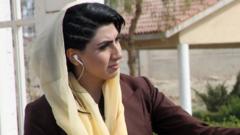21 minutes ago
About sharing
The number of BBC World Service journalists working in exile is estimated to have nearly doubled, to 310, since 2020.
The figures, released for the first time ahead of World Press Freedom Day, reflect press crackdowns in Russia, Afghanistan, and Ethiopia.
Journalists from other countries, including Iran, have lived abroad for more than a decade.
Many face jail sentences, death threats and harassment, both on and offline.
“The only way they can carry on reporting is to be forced out of their homes,” says the director of the BBC World Service, Liliane Landor. “The increase we’re seeing in the numbers of journalists in exile is extremely concerning for press freedom.”
When the Taliban took control in Afghanistan in August 2021, the BBC pulled most of its team out of the country. Female staff were no longer allowed to work, while their male colleagues also faced threats.
In 2022, after its full-scale invasion of Ukraine, Russia introduced a new censorship law, meaning anyone criticising the war could be prosecuted. “I’m calling a war, a war, and for that I could be easily jailed,” says Nina Nazarova, a correspondent for BBC Russian, which has moved its Moscow team to Latvia.
In April this year, Nina’s colleague, BBC Russian correspondent Ilya Barabanov, was labelled a “foreign agent”, accused of “spreading false information” and opposing the war. He and the BBC reject this and are disputing it in court.
Journalists in Myanmar and Ethiopia have also seen increased pressure, which has left them unable to report freely.
Jodie Ginsburg, from the Committee to Protect Journalists, says the number of exiled journalists it offers financial and legal support to has increased by 225% in the past three years.
“We’ve got near record number of journalists in jail, the killing of journalists has reached a high not seen since 2015,” she adds.
Regimes – such as Russia, Iran and Saud Arabia – are becoming increasingly desperate to control the narrative inside and outside their countries, she says.
“I watch my back,” says BBC Persian correspondent Jiyar Gol. When he enters a room now, he says he looks for an escape route. “I have a lot of security cameras in my house. I was warned it would be smart to change my daughter’s school.”
Jiyar hasn’t been to Iran since 2007. When his mother died he couldn’t go to her funeral. He has managed to cross the border to visit her grave.
But since his wife died of cancer four years ago, he has become more cautious. “If something happened to me, what will happen to my daughter? That’s something that’s really in the back of my mind all the time,” he says.
“The Iranian regime has grown bolder,” he adds. “They are under strict sanctions, they don’t care about what the international community thinks about them because they are isolated.”
In March, a presenter for the independent broadcaster Iran International was stabbed in the leg outside his London home, and recently British counter-terrorism police warned of an increased threat to BBC Persian staff living in the UK.
Ten BBC Persian staff recently learned they had been sentenced to a year in prison in their absence. They found out after hackers leaked information from the Iranian judiciary.
Previously, the Iranian Ministry of Foreign Affairs has accused BBC Persian staff of inciting violence, hate speech and human rights abuses.
One World Service journalist in Africa, who spoke anonymously for fear of aggravating leaders in his home country, says his biggest fear is becoming stateless if his government refuses to renew his passport.
For Shazia Haya, from BBC Pashto, life in exile is laced with guilt. She was evacuated to the UK alone in 2022 when the Taliban took control in Afghanistan, leaving her parents and brother in Kabul. She’s worried the Taliban will punish them for her work.
“The night I left home, at around 02:00, I don’t know why but I couldn’t hug my younger brother. And I’m regretting that,” she says. “I’m free here, but they’re in a kind of prison.”
12 January 2023
3 May 2023
12 April
